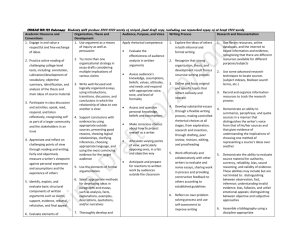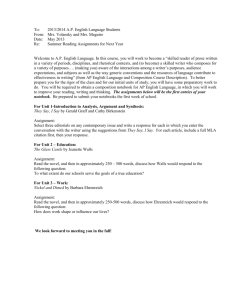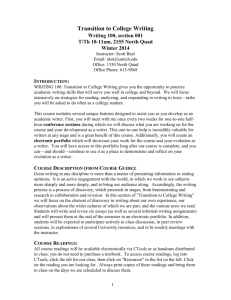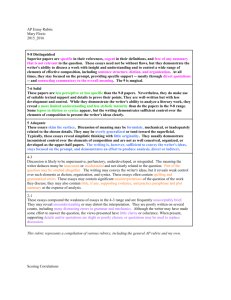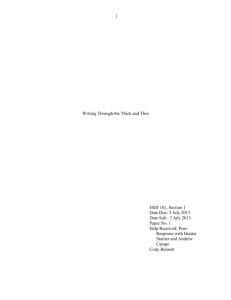Exploratory Paper Assignment
advertisement
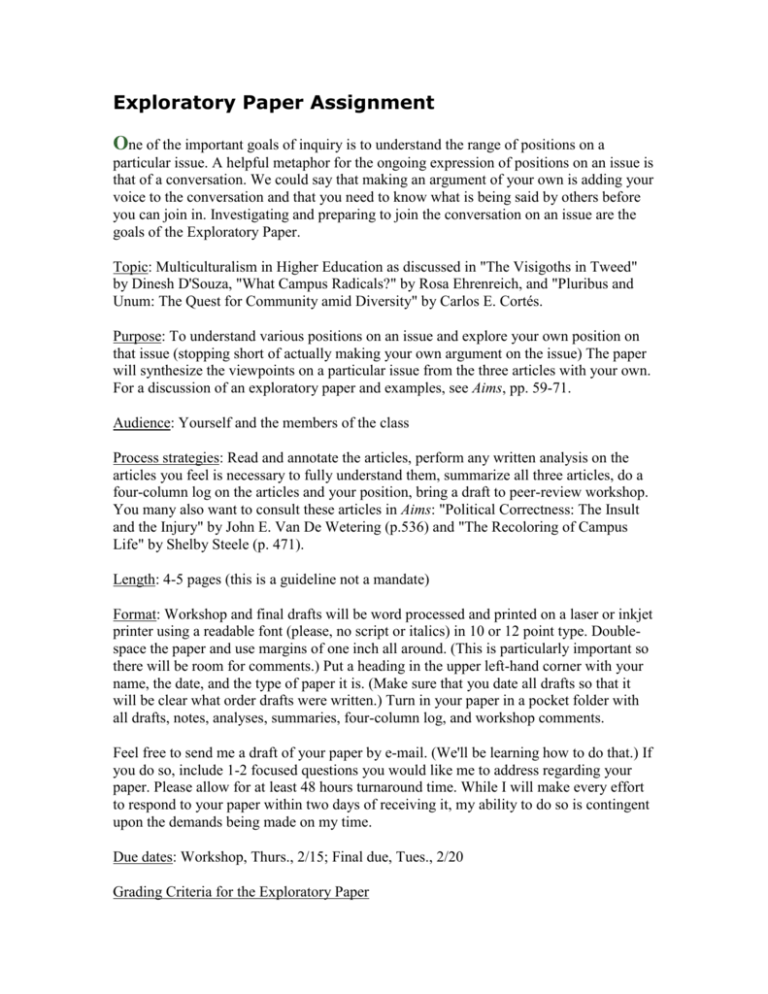
Exploratory Paper Assignment One of the important goals of inquiry is to understand the range of positions on a particular issue. A helpful metaphor for the ongoing expression of positions on an issue is that of a conversation. We could say that making an argument of your own is adding your voice to the conversation and that you need to know what is being said by others before you can join in. Investigating and preparing to join the conversation on an issue are the goals of the Exploratory Paper. Topic: Multiculturalism in Higher Education as discussed in "The Visigoths in Tweed" by Dinesh D'Souza, "What Campus Radicals?" by Rosa Ehrenreich, and "Pluribus and Unum: The Quest for Community amid Diversity" by Carlos E. Cortés. Purpose: To understand various positions on an issue and explore your own position on that issue (stopping short of actually making your own argument on the issue) The paper will synthesize the viewpoints on a particular issue from the three articles with your own. For a discussion of an exploratory paper and examples, see Aims, pp. 59-71. Audience: Yourself and the members of the class Process strategies: Read and annotate the articles, perform any written analysis on the articles you feel is necessary to fully understand them, summarize all three articles, do a four-column log on the articles and your position, bring a draft to peer-review workshop. You many also want to consult these articles in Aims: "Political Correctness: The Insult and the Injury" by John E. Van De Wetering (p.536) and "The Recoloring of Campus Life" by Shelby Steele (p. 471). Length: 4-5 pages (this is a guideline not a mandate) Format: Workshop and final drafts will be word processed and printed on a laser or inkjet printer using a readable font (please, no script or italics) in 10 or 12 point type. Doublespace the paper and use margins of one inch all around. (This is particularly important so there will be room for comments.) Put a heading in the upper left-hand corner with your name, the date, and the type of paper it is. (Make sure that you date all drafts so that it will be clear what order drafts were written.) Turn in your paper in a pocket folder with all drafts, notes, analyses, summaries, four-column log, and workshop comments. Feel free to send me a draft of your paper by e-mail. (We'll be learning how to do that.) If you do so, include 1-2 focused questions you would like me to address regarding your paper. Please allow for at least 48 hours turnaround time. While I will make every effort to respond to your paper within two days of receiving it, my ability to do so is contingent upon the demands being made on my time. Due dates: Workshop, Thurs., 2/15; Final due, Tues., 2/20 Grading Criteria for the Exploratory Paper An 'A' paper will focus on a key issue in the conversation on the role of multiculturalism on college campuses, reporting the positions of D'Souza, Ehrenreich, and Cortés and positioning the writer in this conversation. The paper will explain what position the writer holds on the issue and how his/her position compares and contrasts with those of the authors of the essays as well as how the authors' positions compare and contrast with each other. The paper will be developed with examples from the essays, using quotes, paraphrasing, and summarizing as appropriate. Examples and evidence from outside the essays may be used as well (other readings, personal experience, etc.). The paper will be organized for clarity and readability and written in a civil tone. There will be few if any noticeable mechanical and/or grammatical errors. A 'B' paper will have the qualities of the 'A' paper but may have slightly weaker support, some uneven coherence (awkward paraphrasing, unclear references, rough transitions), or some repeated, minor problems with grammar and/or mechanics. A 'C' paper will generally meet the basic requirements of the assignment but will be deficient in one of the following: accuracy of reporting the essays, development/support, organization/coherence, or style. An 'R' paper will not sufficiently meet the requirements of the assignment, so the writer will have the opportunity to revise it. The highest grade an 'R' can receive is a 'C.' If the paper is not revised and resubmitted within one week of its return, the 'R' grade becomes an 'F.' It is strongly recommended that any writer receiving an 'R' schedule a conference with me for help in revising and/or that s/he visit the Writing Center for additional feedback.
